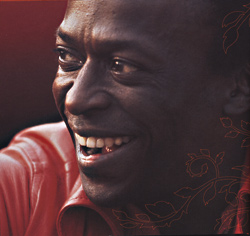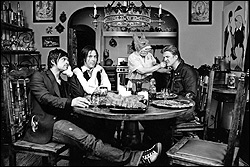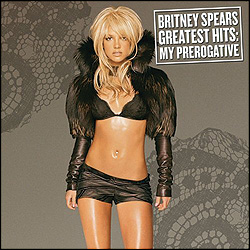Patterson Hood spent a sizable chunk of the Drive-By Truckers’ two-disc 2001 album Southern Rock Opera contextualizing Lynyrd Skynyrd’s “Sweet Home Alabama” and its nuanced expression of regional identity. At about the same time, director Paul Tennant was seeking a more marketable name than Melanie’s Getting Married for his latest shiny romantic fib. And so, as Reese Witherspoon ditched her socialite fiancé for everlasting redneck love last summer in multiplexes across America, Hollywood taught us the true meaning of Ronnie Van Zant’s anthem: Not only can you go home again, but you’ll sure enough be plenty glad you did.
That’s a cliché and a damn lie, and Kix Brooks and Ronnie Dunn want desperately to believe itor rather, they want desperately to believe that it isn’t a damn lie, or even a cliché for that matter. For over a decade, Brooks & Dunn have been two of Nashville’s most capable functionaries, upping the wattage on their arena honky-tonk without busting too many Garthian cornball moves or stooping to the shit-kicker anti-pop posturing of a Travis Tritt. Red Dirt Road (Arista) is their grasp at significance, and it’s just about everything you could ask of a mainstream country record. The licks snarl or cuddle as context calls for, the groove is more Muscle Shoals than Music Row, the thirst to find meaning in the past feels genuine, and Dunn exudes seductive confidence. Hell, the frog-throated Brooks has even developed into a credible simulacrum of a singer. Too bad the duo expressed deeper truths when they were recruiting partners for the “Boot Scootin’ Boogie.”
Dunn’s such a pro he can sing, “It’s where I drank my first beer/It’s where I first found Jesus/Where I wrecked my first car/I tore it all to pieces,” without letting on just how forced the rhyme is. But he can’t keep it from jarring conceptually rather than probing the relationship between these two oppositional elements, Brooks & Dunn leave them be, as if to say, “Lifeain’t it funny?” This casual approach also leeches the music of tension, which is why their label’s comparisons to Exile on Main Street falter. Sure “You Can’t Take the Honky Tonk Out of the Girl” incorporates the female vocals and corkscrew riff of “Tumblin’ Dice,” but there’s none of Exile‘s second-winded late-night struggle against dissipation. Instead, this is roots rock as the Stones defined it in the ’80sirreproachably professional, lacking not in guts but in reach, a finished product rather than an active synthesis, supple enough rhythmically to absorb all shocks, reassuring in its familiarity.
On the other hand, the Truckers’ Brad Morgan may be the least reassuring drummer around. There’s no give to his beat, no flexibilityeither these songs will stand firm or they’ll shatter. Sometimes he races the guitars recklessly, as if worrying, Shit, I’ll never make it to the bridge in time; when things slow down, he lands on the snare with a stolid precision that underlines the band’s fatalism. On the Truckers’ latest, Decoration Day (New West), there’s still more of Crazy Horse’s guitar snaggle than Skynyrd’s fleet boogie in their sound, which is fitting: Their characters may wish they were free as birds now, but deep down they realize that “Lord knows, I can’t change” is an admission of utter imprisonment.
The question at the heart of Decoration Day is “What drives men to leave their homes behind?” The answer is “Well, they’re assholes, mostly, yeah, but that’s not the whole story.” While Brooks & Dunn mull over what purty things to tell their honeys when they make it back, Hood and his cohorts leave no rationalization unturned. An unwanted child is reason enough to stick around or skip town. And on new guy Jason Isbell’s “Outfit,” a father who’s been trapped into wage-slave domesticity advises his son: “Don’t let ’em change who you are, boy/And don’t try to be who you ain’t/And don’t let me catch you in Kendale/With a bucket of wealthy man’s paint.”
Brooks & Dunn shy away from acknowledging such consequences. Even on “When We Were Kings,” when the narrator’s best buddy doesn’t come back from Vietnam, they can only muster a regretful chorus of “sha na na”c’mon fellas, Huey Lewis worked up more bitterness about the war. They exploit the nostalgic connotations of roots rock, but dredge up none of the messy details of the pastthe racial misappropriations, the fear of damnation, the class-conscious defiancethat gives that music its richness. But then, with the final, hidden trackthe truly nutcase gospel arm- waver “Holy War”the repressed memories spew forth like a too quickly downed fifth of Wild Turkey out of a 15-year-old’s gut. Over the lamentations of a wailing choir, we hear tell that “the Jews, the gays, the junkies” have brought down the towers of Babylon and that the final battle between good and evil approaches. Predictably, Brooks & Dunn don’t take a stand one way or another.
YOU CAN ALWAYS go home again, sure. It just won’t be home anymore by the time you make it back. Granted, sometimes I wish the Truckers would let their characters off the hook, for a change of pace if nothing elseforget happy endings, all I’m asking is that just once a woman could get laid without waking up pregnant. But a sense of history’s one bitch of a curseon “My Sweet Annette,” Hood’s narrator still feels remorse for the gal he left at the altar in 1933. No such burden weighs down B&D’s “You Can’t Take the Honky Tonk Out of the Girl,” the story of a crazy cosmopolitan gal (“She lives in L.A./She flies to New York City”) who comes home for a friend’s wedding and whisks the groom off to Cancún. The song takes its title from a line in Sweet Home Alabama, and that’s not all it takes. What’s it mean when superstars pass off a dodgy Hollywood fantasy as a home truth without even realizing the difference themselves? Maybejust maybethere isn’t a difference anymore. But I hope Reese Witherspoon will remember, Southern man don’t need her around anyhow.
Drive-By Truckers play Tractor Tavern at 9 p.m. Wed., Aug. 13. $10 adv./$12.








